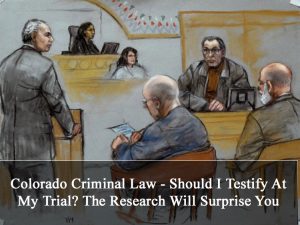Colorado Criminal Law – Should I Testify At My Trial?
By H. Michael Steinberg Colorado Criminal Defense Lawyer – Attorney
 Colorado Criminal Law – Should I Testify At My Trial?
Colorado Criminal Law – Should I Testify At My Trial?
The Research Will Surprise You – One of the most difficult decisions in any Colorado criminal trial is the decision whether to testify or not to testify on your own behalf.
This decision to testify or not to testify is uniquely the Defendant’s – not the lawyer’s, the judge’s or the prosecutor’s. Understanding the way juries think about a Defendant’s decision to NOT testify at trial is critical. A Defendant must have all of the variables necessary to make an informed decision as to whether the risk of testifying is worth it.
The Assumption That Jurors Follow The Law – A “Reality Check” In Colorado Criminal Trials
In Colorado criminal jury trials, it is assumed that jurors will always follow the law.
In this context “the law” is based on two critical legal rules:
I. Jurors are instructed by the Judge that they are not allowed to draw an adverse inference against the Defendant from a Defendant’s refusal to testify;
II. If a Defendant decides to testify and is “impeached” (cross examined) with prior convictions, the jury cannot consider that evidence as showing a “criminal propensity” to commit the crime charged in the case.
Thr Right To Take The “Fifth” – And The “Silence Penalty”
A Defendant who refuses to testify is attempting to prevent the District Attorney from engaging in what can often be a fierce cross examination. The DA is also allowed the right to introduce a Defendants prior (admissible) criminal convictions.
The common belief on the part of most criminal defense lawyers is to recommend to their clients NOT to testify – because of those dangers.
What the research is now demonstrating is this – “silence comes at a price” and juries actually do NOT follow the law and will penalize Defendants who fail to testify. They WILL infer guilt from silence.
This research demonstrates unequivocally that the “silence penalty” is so substantial that it rivals the damage done to a Defendant fierce cross examination and by the potential introduction of a Defendant’s criminal record.
The Decision – Testify Or Not testify – How It Works And Damage Control
While plea bargains result in more than ninety percent of all criminal convictions, a large number of cases go to trial every day all across Colorado. At trial a Defendant has only two trial options, testify or remain silent.
For most defendants the choice between testifying or remaining silent is an exercise in damage control.
The Defendant With Admissible Prior Convictions That Can Used Against Him At Trial Is At Risk
There is no question that social science has established that Jurors “are more likely to convict an accused if they receive information about previous convictions than if they do not.¨
Well established research has demonstrated that “prior conviction impeachment” means jurors will unfairly use prior convictions not as evidence of the Defendant’s character for truthfulness – but to prove that the convictions prove a criminal propensity to commit crimes.
Silence May Not Be The Answer
The advice of most criminal defense lawyers has always been that their client may be better off saying nothing but the empirical evidence now demonstrates that remaining silent comes at a price. Public opinion surveys have concluded that half of the respondents believe that a Defendant who does not testify is “probably guilty¨ or has “something to hide.”
Make this important decision with the advice of your criminal defense lawyer and NOT based on emotions or principle. The decision should always be tactical.
 Colorado Criminal Lawyer Blog
Colorado Criminal Lawyer Blog

